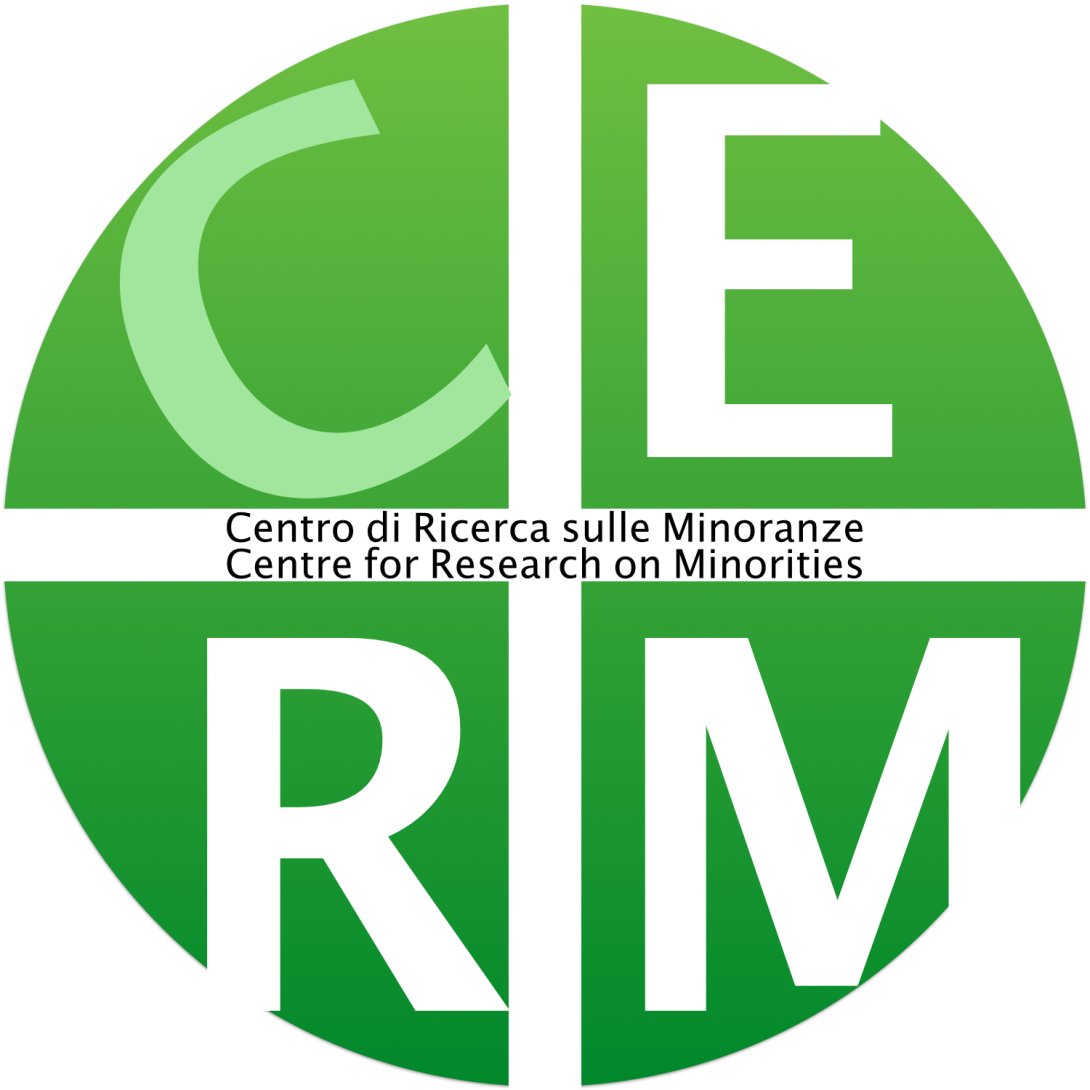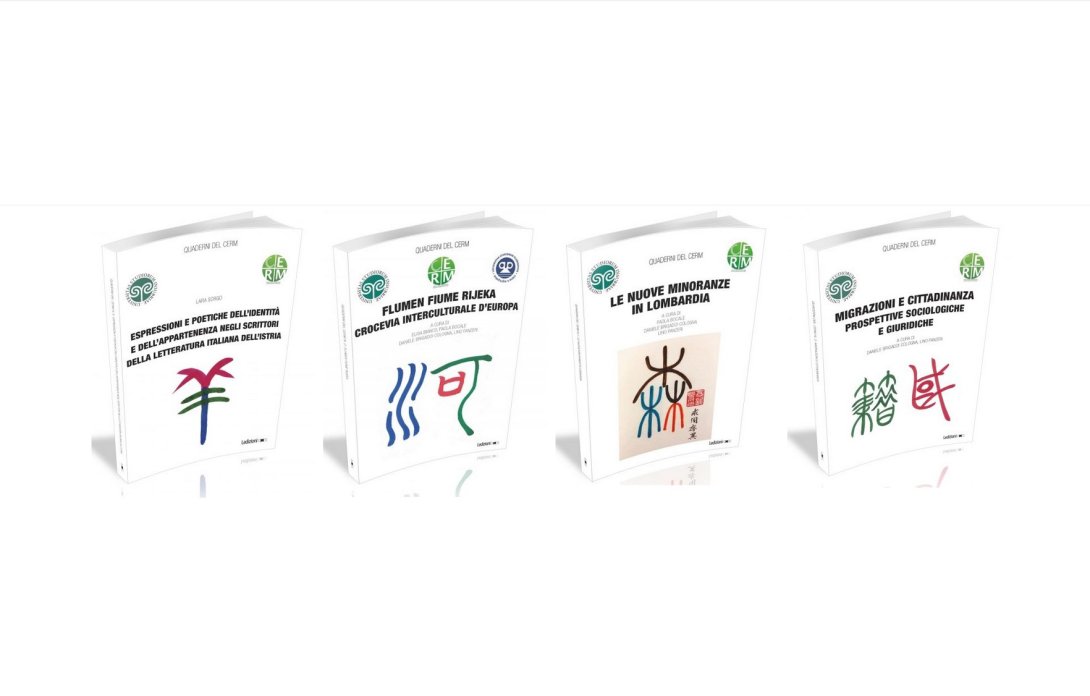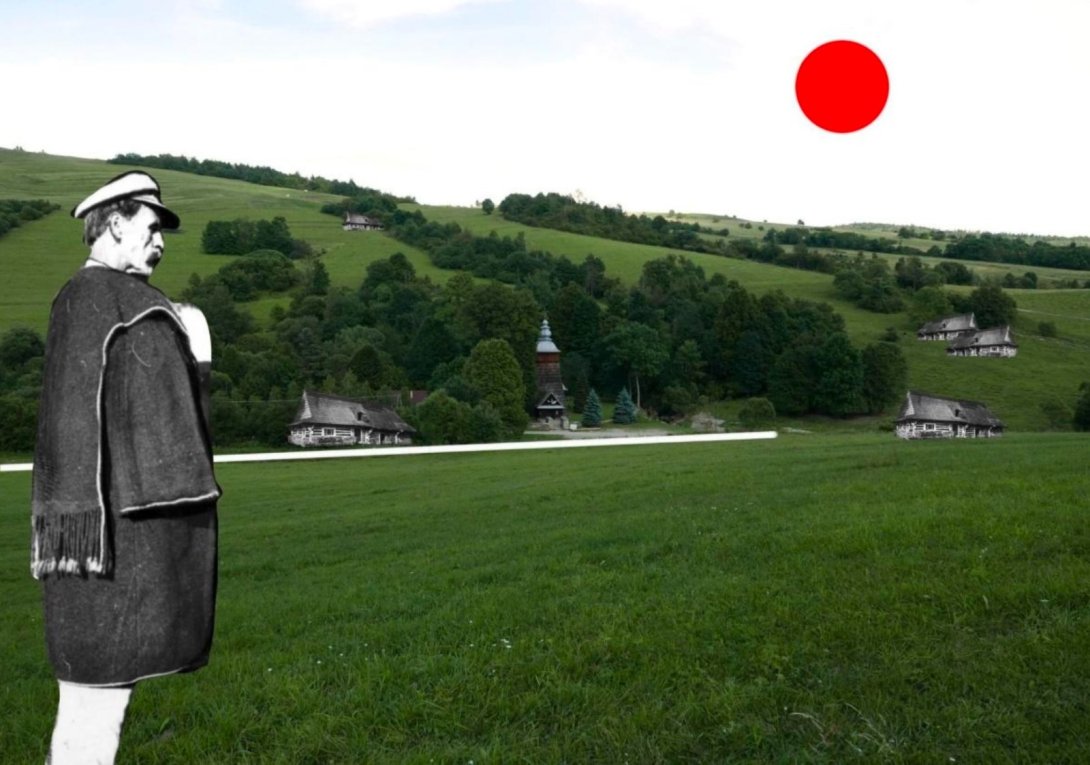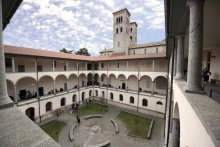
The Centre for Research on Minorities – CERM promotes interdisciplinary research on the sociology and sociolinguistics of minorities, generating synergies among academics, experts, and civil society actors.
Through an inclusive and comprehensive vision of minorities, that aims to enhance their potential of human capital, growth and development, the CERM supports and encourages collaborative cross-institutional and multidisciplinary research on minority communities.
Before the founding of the CERM in 2019, no university research centre had focused its research in, on, and for minority groups.
The opening of the CERM has established the University of Insubria as a vibrant hub of scholarly exchange and collaboration among all those interested in minority issues.
The CERM is based in the city of Como on the Italian-Swiss border, and occupies a distinctive building that overlooks the southwest end of lake Como.


"Forest overgrowth and unfolding hope: cultural landscapes transformations in the Natisone valleys" by Tina Ivnik released in the Quaderni del Cerm Series. The monograph examines the change of the remote border region of the Natisone Valleys (a geographical region located between Friuli and Slovenia, made up of four valleys crossed by four watercourses) from the second half of the twentieth century to the present day, shedding light both on local understandings of these transformations and on the reasons behind them.
Quaderni del Cerm series
The CERM was pivotal in ensuring the Insubria University's participation in The Empowerment of ethnic Minority Students In Vietnam - EMSIV project coordinated by AlmaLaurea Interuniversity Consortium (Italy)
more
Award winning book "Terminology related to the raising of domestic animals in the Ruthenian language of Vojvodina" released in the Quaderni del CERM series
Quaderni del Cerm series
Head of cluster: Daniele Brigadoi Cologna
This Research cluster’s research programme is structured in three distinct research projects:
- Exploring the history of the Zhejiang migration to Italy and its past and present mobilities, with the aim of publishing a History of the Chinese in Italy (1906-2006) within the year 2026.
- Researching language polyglossia within the Chinese diaspora in Italy, surveying extant heritage language schools providing Chinese language instruction to second generation migrants, describing at least one of the most relevant Wu topolects (the focus will be on Yuhuhua and Qingtianhua).
- Establishing a networking platform for Italian researchers that are studying minorities in the PRC and within the Greater Chinese sphere of political influence, organizing an international seminar with the aim of clarifying the current state of minority policies in the PRC and its effects on the PRC’s periphery.
Head of cluster: Paola Bocale
The aim of this cluster is to examine issues related to the status and protection of ethnolinguistic minorities in the states that emerged from the former Soviet Union after the dissolution of the country in the early 1990s. These include policies of language planning and language in education, including those implemented in several former USSR countries with regard to the teaching of Russian and other minority languages; new forms of control over the use of minority languages; the politics of linguistic landscaping; power politics, such as the balances and tensions between central government authorities and the authorities of individual republics over the status of minority languages in the Russian Federation; notions of identity belonging and self-determination of minorities, that stimulate and influence ideological, political and cultural movements in the post-Soviet region. In consideration of the geographical, ethno-cultural and historical specificities of the post-Soviet space, particular attention is paid to linguistic dynamics taking place in urban contexts, to recent migratory phenomena, and to new dimensions and configurations of multilingualism in the border areas.
The following main projects are in progress:
- Investigating forms and issues of Ukrainian heritage education in Italy. There is currently no collated, published information about how many Ukrainian heritage schools operate in Italy, how they function and who they serve. No national surveys have been conducted to date and no scientific studies have been carried out to provide insights and information on the topic. This project aims to contribute to filling this gap and fostering this research direction.
- Exploring the linguistic landscape of Daugavpils (Latvia) in order to find out what impact the language and education policies implemented in Latvia have on the minorities living in the town and in the Latgalia region.
- Examining the interweaving of identity negotiation and language learning in the Italian minority community of Crimea, in order to uncover and document longitudinally the experience of those who participate in revitalization projects.
Head of cluster: Lino Panzeri
The research projects currently being developed touch on the following main thematic areas:
- Protection of linguistic rights in Italy, with particular references to new minorities;
- Models for the protection of minorities in comparative law;
- The personal autonomy of members of minorities in the Estonian Law of 1925.
Head of cluster: Andrea Sansò
The ongoing research projects touch on the following thematic areas:
- Language discrimination across Europe: glottophobic phenomena and accent discrimination with respect to both regional and learner/immigrant varieties;
- Heritage languages in Italy: their vitality and sociolinguistics;
- Historical minorities and local languages (“dialects”) in Italy, and their degree of endangerment.
Head of cluster: Nieves Arribas
The research projects currently scheduled include:
- The role of interpreters and translators in war conflicts;
- Spanish Judeo speakers in Turquia;
- The culture of Gypsies and Rom.
Coordinator: Alessandro Ferrari
Head of cluster: Martina Codeluppi
The Research cluster “Minorities and digital media” aims to explore the following main themes:
- The relationship between digital space and lived space. The research cluster will focus on online platforms by analyzing their various declination and investigating their power to create a free space able to counterbalance the marginalization that minorities often face, concerning language, ethnicity, gender, etc. In particular, we will address the phenomenon of The Great Translation Movement and shed new light on the ideological fallouts of translation by mapping the changeable perception of contemporary China conveyed by online resources and social media.
- The relationship between technology and identity. We will focus on digital media as both a determining factor in the creation of new cultural identities, such as the incarnations of translingualism in migrant literature, and as a vehicle of discrimination capable of exacerbating the marginalization of certain minorities. We will focus on Sinophone poetry written by ethnic minorities in China and the use of online space to voice their literary espression.
Particular attention will be paid to the context of contemporary China and to its diasporic manifestations.
Head of cluster: Valter Zanin
Head of cluster: Sergio Basso
How are minorities represented in the media? Who handles and manages the storytelling about them? Do these minorities manage to have an original voice and find room to narrate themselves, or are they narrated by a small group of holders of the “power of storytelling”, the so-called “scepter of communication”?
This section aims to investigate this topic, with a primary focus (for organizational agility and cogency of the issues) on the Chinese minority and on the specificities of the Italian theatrical, artistic, TV and cinematographic market. However, the survey will also be open to other communities and to their inclusion / visibility within the European and North American performance industry.
Head of cluster: Elisa Bianco
The Research cluster “Minorities and History” aims to explore the non-religious minorities in the early modern Europe. In particular:
- The Cagots, a minority of uncertain origins, without any specific linguistic, ethnic or religious traits, settled in western France and northern Spain.
- The gipsies, who in recent years gained new attention by scholars of early-modern history: see Büchel, Toni (ed.), "Zigeuner" im Europa der Frühen Neuzeit.Wien: Institut für die Erforschung der Frühen Neuzeit, 2019; F. Timbers, "The Damned Fraternitie": Constructing Gypsy Identity in Early Modern England, 1500-1700. New York: Routledge, 2016; L. Mróz, Roma-Gypsy Presence in the Polish-Lithuanian Commonwealth 15th-18th Centuries. Budapest-New York: Central European University Press, 2015; R.J. Pym, The Gypsies of Early Modern Spain, 1425-1725. New York: Palgrave Macmillan, 2007. The cluster aims to follow this path of research with a focus on the Italian States in the early modern period.
- Other non-religious minorities (such as Uskoks, fugitive slaves).
Head of cluster: Federica Formato
The research programme includes the following areas of interest:
- language as an inclusive device in Italian and other languages;
- hate speech towards gender minorities;
- representation of gender minorities in the media.
Head of cluster: Valentina Albanese
This field treads the path of pluriversality. Indeed, there are many variables (the pluriverse) in which relations between spaces, communities, nature, land, territoriality, sovereignty, etc. are organised and conceptualised.
Therefore, it is necessary to structurally reflect on the power dynamics underlying colonialism and the materiality of knowledge production as well as in the practices of living. Finally, using the decolonial topic as an observational lens of being-human-on-earth means making the reflections left by colonialism in terms of gender, patriarchy and many other forms of social power found in topics, among others, such as race, religion, ethnicity, sexuality, disability and heteronormativity, in accordance with intersectional theories, more clear and visible.
Topics:
- education, gender studies and colonialism in European academic programmes
- multiversal forms of space appropriation (murals, street dance, demonstrations, protests, etc.)
- tourism as a form of colonisation
- putting voices from the margins at the centre of academic debate.
- Tatiana Agranat
- Diana Aguiar Vieira
- Valentina Albanese
- Giovanni Andornino
- Sergio Basso
- Konstantin Batsak
- Helena Bažec
- Stefano Becucci
- Stefano Bonometti
- Soumaya Bourougaaoui
- Maria Vittoria Calvi
- Alberto Castaldini
- Alberto Castelli
- Renzo Cavalieri
- Francesco Ciconte
- Mario Salvatore Corveddu
- Mario De Grandis
- Salvatore Del Gaudio
- Valeria Ferraro
- Federica Formato
- Anna Granata
- Olga Irimciuc
- Omar Hashem Abdo Khalaf
- Marinko Lazzarich
- Ruggero Lanotte
- Cristina Li
- Piergabriele Mancuso
- Ana Luísa Martinho
- Lorenzo Mastropierro
- Luciano Mecacci
- Anna Mongibello
- Francesca Romana Moro
- Valentina Pedone
- Anna Lia Proietti Ergün
- Fabio Quassoli
- Oleg Rumyantsev
- Daniel Russo
- Mirko Sacchini
- Ana Sagi-Vela González
- Giustina Selvelli
- Vittorio Springfield Tomelleri
- Darya Vashkialevich
- Giorgio Maria Zamperetti
- Valter Zanin
- Michał Szymko (2025)
- Tina Ivnik (2024)
- Aleksandar Mudri (2023)
- Elisa Gugliotta (2023)
- Lara Sorgo (2022)
2025
Seminar "Memories 西游記 Notes and Maps of a Journey to the West" Ciaj Rocchi, Matteo Demonte, Daniele Brigadoi Cologna
poster
Seminar "Moj Dom - Refugees, migration and erased memories in the aftermath of Yugoslav wars" Davor Marinković and Lorenzo Scalchi
poster
Seminar "Multilingualism and multiculturalism in Latvia: the case of Daugavpils"
Ilze Oļehnoviča, Jelena Semeņeca, Solveiga Liepa (University of Daugavpils)
Congratulations to the winner of the 2024 CERM Prize
Announcement
2024
Armenia: identity, belonging and dispersion, Narine Ogandjanian, National Academy of Sciences of Belarus
poster
The second Emsiv Project Meeting to be held in Como on 17-18 October 2024
programme
The Symposium of the Italian Association for Chinese Studies (AISC) to be held in Como on September 13, 2024
programme
CERM 2024 Prize
The CERM announces the CERM 2024 Prize for the best doctoral dissertation discussed within the last year on topics related to minority communities
announcement
17.05.2024
«Kumārajīva – Kumarajiv: historical importance and contemporary relevance of the great Asian translator and intercultural mediator in the work of Kunwar Narain»
Alessandra Consolaro, Full Professor of Hindi Language and Literature, University of Turin
Discussant: Daniele Brigadoi Cologna
2023
Congratulations to the winner and runner-up of the 2023 CERM Prize
announcement
24.11.2023
“Thirty years ago on the Silk Roads" – The experiential journey as an initiation into cultural diversity
Prof. Daniele Brigadoi Cologna – Dr. Davide Carlo Ferraris
26.10.2023
Round Table «Le scuole ereditarie in Lombardia e il loro ruolo nel mantenimento delle lingue delle comunità migranti»
programme
Appeal for Khaled El Qaisi
text
15.09.2023
Translation Sites in Istanbul: The non-Muslim Minorities in Moda and Yeldegirmeni Neighborhoods
Ayşe Ayhan, Yildiz Technical University
15.05.2023
«State Control, Surveillance and Minority Policies in China»
Seminar with Børge Bakken
Discussant Daniele Brigadoi Cologna (University of Insubria – CERM)
02.05.2023
Book presentation “Storia della Bielorussia. Da Rahvalod di Polack a Lukasenka” by Massimo Vassallo
Introduction: Ekaterina Grishanova (University of Insubria), Darya Vashkialevich (University of Insubria)
Discussant: Paola Bocale (University of Insubria - CERM)
19.04.2023
Seminar “La linea dell’accento”
Enrica Bracchi, Nantes Université; Paola Bocale, Università dell’Insubria; Silvia Calamai, Università di Siena; Rosalba Nodari, Università di Siena; Mirko Sacchini, Università dell’Insubria & Tyumen State University; Darya Vashkialevich, Università dell’Insubria
Moderators: Andrea Sansò, Università dell’Insubria; Maria Paola Bissiri, Università dell’Insubria
18.04.2023
Seminar “The verbal classes of Russian Aktionsarten and their sociolinguistic dimension how morphology decreases pragmatic distance”
Mirko Sacchini, Università dell’Insubria & Tyumen State University
Discussant Paola Bocale, Università dell’Insubria
04.04.2023
“My people La mia gente” by Oodgeroo Noonuccal
Margherita Zanoletti (Università Cattolica del Sacro Cuore),
Paola Bocale (Università dell’Insubria), Ekaterina Grishanova (Università dell’Insubria)
Cerm 2023 Prize announcement
text
Winter School “How to Document the Present: Oral History and Memory of the War”
Como, 23-27 January, 2023
programme
21.02.2023
International Mother Language Day 2023
“L’insegnamento dell’ucraino nelle scuole ereditarie della Lombardia”
Veronica Rusnak Scuola ucraina Kvity Ucrainy (Bergamo)
Halyna Barlyak, Mariia Lagish Centro per lo studio della lingua madre Zernyatko Marika Zabiyaka Scuola ucraina Solomia Krushelnytska (Milano)
Oksana Kolotynska Scuola ucraina Girasole in memoria di Gregorij Tkachuk Discussant: Paola Bocale
2022
06.12.2022
Round Table Ukraine and Russia: What are the chances for peace?
Rossella Bettoni (Università di Trento)
Alberto Castelli (Università dell'Insubria)
Salvatore Del Gaudio (Università di Salerno & Boris Grinchenko Kyiv University)
Mara Morini (Università di Genova)
Oleg Rumyantsev (Università di Palermo)
Francesco Strazzari (Scuola Sant'Anna Pisa)
Discussants: Paola Bocale, Daniele Brigadoi Cologna
15.11.2022
The Italian community in Crimea: Identity, memory, revitalization
Paola Bocale, Giulia Giacchetti Boiko, Stefano Conca Bonizzoni
17.11.2022
International Conference RELIGIOUS MINORITIES: A POLITICAL TRANSMEDITERRANEAN CHALLENGE
Organised by the REDESM in collaboration with the CERM
programme
17.11.2022
Romanian literature in the Republic of Moldova
Olga Irimciuc, Paola Bocale, Roberto Russo
08.11.2022
Quando gli immigrati vogliono pregare, M. Ambrosini, S. D. Molli, P. Naso (Eds.)
Q&As with authors
Discussant: Alessandro Ferrari (Università degli Studi dell’Insubria)
06.10.2022
Seminar “La comunità italiana in Turchia, tra passato e presente”, Como
Anna Lia Proietti Ergün, Ph.D, Dept. of Western Languagesand Literatures
YıldızTechnical University
Condolences for Prof. Fiorenzo Toso
text
Cerm 2022 Prize laureate
text
Cerm 2022 Prize
announcement
26.05.2022
Seminar "Storia dell'Ucraina dalla Rus' kyivana ad oggi: le radici del tragico e sanguinoso conflitto dei nostri giorni"
Q&As with author Massimo Vassallo
Discussants: Paola Bocale (University of Insubria - CERM), Salvatore Del Gaudio (Università di Salerno & Boris Grinchenko Kyiv University)
19.05.2022
International Conference "Aver Cura in una società multiculturale: la donazione di sé, la promozione della salute e l’educazione del pazient
programme
12.05.2022
Race, Ethnicity and the Policies of American University
Evelyn Hu Dehart (Brown University, Rhode Island, Usa), discussants: Valter Zanin (Università di Padova), Daniele Brigadoi Cologna (Università dell’Insubria)
05.05.2022
“Il Legionario”
Film screening with Q&As with film director Hleb Papou
12.04.2022
“Il suicidio dell’Urss” by Sergio Romano
Discussants Paolo Luca Bernardini, Paola Bocale, Angela Di Gregorio
07.04.2022
International Conference "Interpreti e mediatori nei conflitti bellici"
Nieves Arribas Esteras, Enrique Santos Unamuno, Lucía Ruiz Rosendo, Jesús Baigorri Jalón, Linda Fitchett
programme
24.03.2022
Seminar Zero – L’invisibilità è un potere, non una debolezza
Mohamed Hossameldin, Stefano Voltaggio, Sergio Basso
Starting from 24.02.2022
Online free course "Introduction to Romanian"
Olga Irimciuc, Università degli Studi dell’Insubria
17.03.2022
Round Table Ucraina e Federazione Russa: Indagine sulla crisi
Alberto Basciani, Università Roma Tre
Paola Bocale, Università dell’Insubria
Daniele BrigadoiCologna, Università dell’Insubria
Salvatore Del Gaudio, Boris Grinchenko Kyiv University
Andrea Franco, Università di Macerata
OlegRumyantsev, Università di Palermo
Alessandro Vitale, Università di Milano
08.03.2022
Round Table Le donne rifugiate in Italia, tra qui e altrove
Ana Estrela (Bari), Libere Nantes (Roma), Ekaterina Minina(Roma), Q.F. (Como), Paola Bocale(Insubria), Federica Casartelli (ASGI), Stefano Sosio (Symploké)
03.03.2022
Seminar Lev Vygotskij Educazione e minoranze nazionali
Luciano Mecacci, Academia Europaea
Discussants: Paola Bocale, Università degli Studi dell’Insubria
Stefano Bonometti, Università degli Studi dell’Insubria, Daniele Brigadoi Cologna, Università degli Studi dell’Insubria, Anna Granata, Università degli Studi di Milano-Bicocca
21.02.2022
Giornata Internazionale della Lingua Madre Le scuole ereditarie in Italia. Situazione attuale e prospettive
GerganaHristova, Scuola Bulgara P. Yavorov (Milano)
Lisa Wang, Lili Wang Scuola Cinese Kemo Zhongwen Xuexiao (Como)
Li Ang, Jessica Macchi Centro Culturale Cinese Longjia (Milano)
Ioana Vasilescu Scuola Romena S. Parascheva(Torino)
Lioudmila Lazareva Centro Russo Armonia (Milano)
Silvia Vlaskova Scuola Slovacca Slovencina Lab
Kessia Chamba Castillo, Olga Pérez Sastre Centro Educativo per Ispanofoni Fe y Alegria (Milano)
Tetyana Tarasenko Scuola Ucraina Prestige (Roma)
Discussants: Nieves Arribas, Paola Bocale, Daniele Brigadoi Cologna, Olga Irimciuc, Tatiana Kravez (University of Insubria - CERM)
20.01.2022
Seminar Chroniqueers Time, care, visibility in queer subjects with chronic illnesses
Mara Pieri, Centre for Social Studies, University of Coimbra
Federica Formato, Centre for Transforming Sexuality and Gender, University of Brighton
2021
01-03.12.2021
International Conference Minorities in the post-Soviet space thirty years after the dissolution of USSR
programme
07.10.2021
“L’unica persona nera della stanza”
Q&As with author Nadeesha Uyangoda
14.09.2021
Digital technology, Surveillance and Internal Migration in China
Rogier Creemers, Leiden University
Discussant: Daniele Brigadoi Cologna, University of Insubria
Moderator: Lucrezia Goldin, China Files
5 marzo – 4 giugno 2021, 9 – 10.30
Online seminar series Introduction to the culture, history and music of the Jews of the Diaspora and the state of Israel
From text to context. Jewish culture, from the Torah to the State of Israel
Piergabriele Mancuso (University of Insubria - CERM)
Webinar – 24.05.2021, 14-17
Web-based platforms for language learning: the case of Revita, University of Helsinki
Roman Yangarber (University of Helsinki)
Webinar – 15.04.2021
L’albanofonia in Italia. Prospettive linguistiche e giuridiche
programme
Webinar – 17.03.2021
Migrazioni e cittadinanza – Prospettive sociologiche e giuridiche
programme
Webinar – 08.03.2021
Emancipazione, autonomia e protagonismo nelle migrazioni femminili
Paola Bonizzoni (University of Milan "La Statale")
Martina Cvajner (University of Trento)
Francesca Lagomarsino (University of Genova)
Irene Pavlidi (ASGI)
Irene Pellizzone (University of Milan "La Statale")
Elly Schlein (S&D on Dublin Regulation)
Moderators: Paola Bocale (University of Insubria - CERM), Barbara Pozzo (University of Insubria)
Webinar - 10.02.2021
Heritage Languages and Multilingualism Day
programme
2020
Webinar – 10.12.2020
Italia e Cina: 50 anni di relazioni
Daniele Brigadoi Cologna, CERM & Torino World Affairs Institute
Giovanni Andornino, TOChina Centre dell’Università degli Studi di Torino & Torino World Affairs Institute
Giuseppe Gabusi, TOChina Centre dell’Università degli Studi di Torino & Torino World Affairs Institute
Arianna Ponzini, TOChina Centre dell’Università degli Studi di Torino & Torino World Affairs Institute
Stefano Beltrame, Ministro plenipotenziario, Ministero degli Affari Esteri e della Cooperazione Internazionale
Barbara Pozzo, Direttore DiDEC & Principal Investigator dell’Unità di ricerca Insubria nell’ambito del Progetto PRIN: «The One Belt -One Road (OBOR) Initiative: Legal Issues and Effects on the Financing and Development of Maritime and Multimodal Infrastructures by Chinese Investors in Italy»
Moderator: Alessandra C. Lavagnino, Direttore dell’Istituto Confucio dell’Università degli Studi di Milano
Webinar - 09.12.2020
Sfide attuali della cittadinanza
Jada Bai, Fondazione Italia Cina
Marilena Umuhoza Delli, author
Fatima Edith Maiga, #italianisenzacittadinanza
Sabrina Onana, film director
Xavier Palma, #italianisenzacittadinanza
11.05.2020
Web Seminar
LE NUOVE MINORANZE IN LOMBARDIA
Profili linguistici, giuridici, socio-pedagogici e religiosi
programme
03.06.2020
Il paese delle badanti
Q&As with author Francesco Vietti
10.06.2020
Aspettando la fine della guerra
Q&As with author Daniele Brigadoi Cologna
Discussants: Alessandra C. Lavagnino, Università degli Studi di Milano; Valter Zanin, Università degli Studi di Padova
15.06.2020
Italianità a confronto: Crimea e Quarnero
Paola Bocale, Università dell’Insubria
Daniele Briagadoi Cologna, Università dell’Insubria
Lino Panzeri, Università dell’Insubria
22.06.2020
La lingua ucraina moderna: fasi di formazione
nel contesto slavo orientale
Salvatore del Gaudio, Università di Kyiv Borys Hrinčenko
(Borys Grinchenko Kyiv University), Ucraina
Discussants:
Paola Bocale, Università dell‘Insubria
Khrystyna Krychkovska, Università dell‘Insubria
International Conference 28-29.10.2020
Flumen - Fiume - Rijeka
Crocevia interculturale d’Europa
programme
2019
27.11. 2019
Bessarabia 1939-2019: echi e riflessi nella letteratura
Violeta Popescu, Centro Culturale Italo-Romeno (Milano)
Natalino Fioretto, Casa Editrice Graphe.it
Olga Irimciuc, Università degli Studi dell’Insubria
Moderator: Paola Bocale, Università degli Studi dell’Insubria
- Forest Overgrowth and Unfolding Hope: Cultural Landscape Transformations in the Natisone Valleys (T. Ivnik), Milano, Ledizioni & University of Ljubljana Press, 2026
- Terminology related to the raising of domestic animals in the Ruthenian language of Vojvodina (A. Mudri), Milano, Ledizioni, 2024
- Tunisian Arabizi: Linguistic Analyses and Corpus Building using Natural Language Processing (E. Gugliotta), Milano, Ledizioni, 2024
- Espressioni e poetiche dell’identità e dell’appartenenza negli scrittori della letteratura italiana dell’Istria (L. Sorgo), Milano, Ledizioni, 2023
- Minorities in the post-Soviet space thirty years after the dissolution of USSR (edited by P. Bocale, D. Brigadoi Cologna, L. Panzeri), Milano, Ledizioni, 2022
- Migrazioni e cittadinanza (a cura di D. Brigadoi Cologna e L. Panzeri), Milano, Ledizioni, 2022
- Flumen Fiume Rijeka Crocevia interculturale d’Europa (a cura di E. Bianco, P. Bocale, D. Brigadoi Cologna, L. Panzeri), Milano, Ledizioni, 2021
- Le nuove minoranze in Lombardia (a cura di P. Bocale, D. Brigadoi Cologna, L. Panzeri), Milano, Ledizioni, 2020
2021
- September 14 - "Digital technology, Surveillance and Internal Migration in China"
Browse the section
For information
Via M. E. Bossi 5, 22100 Como
Tel. +39 031 238 4181





